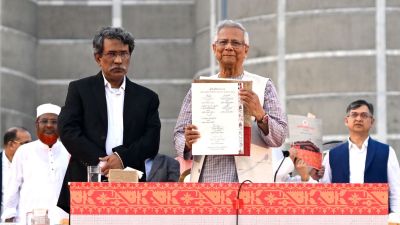Comrades spoil Buddha’s Jakarta party
West Bengal Chief Minister Buddhadeb Bhattacharya is scheduled to leave for Jakarta on August 22, and he is a worried man. Last Saturday he ...

West Bengal Chief Minister Buddhadeb Bhattacharya is scheduled to leave for Jakarta on August 22, and he is a worried man. Last Saturday he signed an agreement and announced with much enthusiasm: ‘‘I promise to give land to the Salem group for setting up a township.’’ The Salem Group from Indonesia was keen on pumping in FDI into a township project in Bhangar in South 24-Parganas for which it needed 5100 acres.
Within days the Chief Minister’s plan has hit a wall. His party has vehemently opposed and successfully blocked the passage of an amendment to the Land Reforms Act. The amendment was to be moved tomorrow but has been dropped now. This might make things difficult for projects like the Salem’s.
‘‘What do I tell them now?’’ a distraught CM asked two cabinet colleagues from the Revolutionary Socialist Party and the Forward Bloc, both of which opposed the amendment along with a section of the CPI(M).
Party sources say the CM ran into the first obstacle in the form of Krishak Sabha, the farmer’s wing of the party which has a support base of 12 million. This is the main source of strength for the party in the rural areas. The Sabha objected to the way in which the amendment was proposed to be made in the Land Reforms Act.
The proposed amendment suggested that ‘‘if the state government was satisfied with a project report filed by any person that he required land for engineering colleges, medical colleges, universities…development of wasteland tourism, plantation of medicinal or other commercial crops, it may, by order, allow such person to acquire and hold land in excess of the ceiling area applicable to him…’’
A senior CPI leader said, on the condition of anonymity, that ‘‘it was precisely what Mckinsey had recommended in its report to the government. Mckinsey was making an entry through the backdoor,’’ he said. An influential leader of the Krishak Sabha agreed.
About two weeks ago the state government had sent a Land Reforms Bill for circulation. Sources in the Left Front said the Bill had been drafted by the state’s Land Reforms Minister, Abdur Rezzak Mollah, under pressure from the Chief Minister.
Subsequently, Mollah informed the party that he was against the Bill and would resign if it was passed in the Assembly. He even had a meeting with the CPI(M) state secretary, Anil Biswas, in the presence of the Chief Minister, said sources. A large section of the party’s hardliners decided to back him.
The reason for the gathering storm was not hard to seek. Assembly elections are due by the middle of next year and many considered such an amendment could prove to be suicidal.
The entire blame for the fiasco is now sought to be shifted to the government’s administrative machinery. ‘‘It was the Chief Secretary who had drafted the amendment and it varied widely from what had been discussed by the party members. Even the Chief Minister was present at the discussion at the state secretariat level on this issue,’’ said Benoy Konar, a central committee member and a veteran Krishak Sabha leader.
Former chief secretary Ashok Gupta during whose tenure the amendments were drafted fumed at the allegations. ‘‘What’s the point of asking me this question now! What have I to say on this! I am no more in the government.’’



- 01
- 02
- 03
- 04
- 05




























